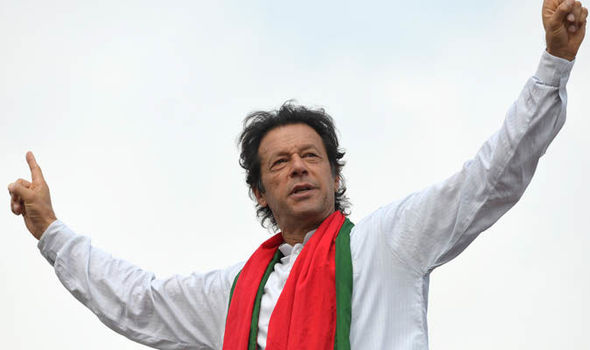Image Taken: Imran Khan’s Facebook Page
The 2013 general election is perhaps the most important election in the country’s history. They proposed positive changes in political views. They are able to mobilize the masses to leave their homes and vote to become an active part of the political process. They were a fatal blow to the Venetian noble oligarchs.
They brought a political party that did not oppose nobility or family politics-Pakistan Tehreek-e-Insaf (PTI).
ISSUES FACED BY PAKISTAN:
Pakistan’s economy is always in chaos. For decades, Pakistan’s real per capita income growth has lagged behind many of its peers. Corruption and tax evasion are still rampant, leading to a decline in the state’s revenue. For example, less than 1% of Pakistanis pay income tax.
In addition, Pakistan is facing a prolonged energy crisis that has caused regular power outages in the country. The economy is very vulnerable to changes in global crude oil prices because 80% of its oil demand is met by imports. The recent rise in oil prices has exacerbated the country’s already fragile fiscal position. Many state-owned enterprises are losing money, and the government has failed to make enough progress in privatizing and reducing bureaucratic redemption and improving the convenience of doing business.
These problems have put heavy pressure on the country’s currency. Since December last year, the Pakistani rupee has fallen by more than 20%, a drop of 40%. Its foreign exchange reserves are also rapidly declining. In September, these debts were 8.4 billion U.S. dollars (7.25 billion euros), which was only enough to cover Pakistan’s debt to be repaid by the end of the year.
STEPS TAKEN BY PTI GOVERNMENT:
PTI has completed its two-year rule in June of this year. Khan’s government has brought institutional and developmental reforms in many sectors.
The visible areas of improvement are cutting down of current account deficit, elimination of unnecessary government expenditure, and repayment of the direct loan worth 22 billion and launching of power generation projects that that will supply 8,018 MW power to the country. Furthermore, PTI government has worked to improve the international image of Pakistan. Steps were taken to contain COVID-19 and the Smart Lockdown strategy introduced by Imran Khan is gathering praise from all over the world.
Under Ehsaas Emergency Cash programme, the government has provided Rs12, 000 to millions of families.
CORRUPTION:
For many years, the current Prime Minister of Pakistan, Imran Khan, has commented on his intentions to conduct an intensive anti-corruption campaign after he took office during his campaign throughout the past year. Khan promised “strict accountability” and suppression of “sacking the people of this country” to visualize the large-scale anti-corruption campaign First, the Asset Recovery Unit (ARU) has been established, with its headquarters in the Prime Minister’s Office in Islamabad, to retrieve money or hide assets overseas.
This department is composed of bank officials and representatives of all government intelligence agencies and aims to target high-level corruption at an early stage. •Second, a law to promote and reward whistleblowers was recently announced. Khan outlined the new incentives at a press conference in Lahore. He said: “The law will invite compatriots to identify corrupt persons, and [whistleblower] will recover 20% of the stolen money and assets from these people.” Third, the Pakistani government has asked foreign governments for assistance in recovering the proceeds of corruption.
The Secretary of State for the Interior Sajid Javid agreed to cooperate and recently announced a joint statement with the Minister of Law of Pakistan. Titled “UKPakistan Justice and Accountability Partnership”, it enumerates that the two governments will track corruption and restarts the bilateral prisoner transfer process so that the corrupt can be brought back to the Pakistani courts.
ECONOMIC DEVELOPMENT AND REFORMS:
In the two years that the PTI government and Imran Khan served as prime minister, Pakistan set the highest ever record of remittances from overseas Pakistanis in July 2020, reaching US$2.768 billion.
In addition, according to official data, the government can avoid a balance of payments (BoP) crisis through effective long-term policies. The current account deficit in 2018 was $19.9 billion, and now it is only $3 billion. In addition, the government has introduced cheap loans to assist small traders so that they do not have to fire employees due to lack of funds. In addition, it also paid three months of bills for traders, thereby reducing their burden.
POPULARITY:
The newly elected party showed progress in its first year in power.
According to a survey conducted by Gallup in March 2014, public satisfaction with K-P is the highest, reaching 57%. Contrary to the public satisfaction in Punjab (27%) and Sindh (26%), one can see that the provinces led by PTI have indeed increased.
ADMINISTRATIVE REFORMS:
DE-POLITICISATION OF POLICE AND MERIT BASED RECRUITMENTS:
The K-P government has completely depoliticized its police force, and no minister, chief minister, or even Imran Khan himself will interfere with the system.
There is absolutely no zero-tolerance policy for corruption. So far, 129 police officers have been fired, and another 7 have been demoted due to corruption and abuse of power. Previously, appointments were made through political intervention, but now performance-based NTS tests have been introduced for recruitment purposes.
ONLINE FIR SYSTEM:
The government has also introduced an online FIR system for the first time in Pakistan.
Through this system, people can initiate FIR against anyone without causing any danger, and the police must respond after verification. So far, 1,030 FIRs have been registered through the online system. IG police officer Nasir Durrani is eager to establish model police stations throughout K-P. According to a TV channel report, the three police stations in Peshawar have been transformed into demonstration police stations.
STRICT ACTIONS AGAINST CORRUPTION:
According to Transparency International, K-P was once considered the most corrupt province. Imran had promised before the election that he would eliminate corruption if given the opportunity; so far, he seems to be on the right track. In response to public complaints, he has dismissed the two ministers of K-P, which is admirable.
HEALTH:
Now, all government hospitals in K-P provide free medicines and treatment, and the government has also launched a campaign called “Sehat Ka Insaf” to fight polio. So far, the campaign has provided immunizations to 1.3 million children. The World Health Organization (WHO) delegation that met Imran congratulated him on his successful anti-political campaign, as a recent report showed that no cases of polio were found in KP after the campaign.
EDUCATION:
PTI has demonstrated that its plan will also bring about fundamental educational changes. The government has recruited 8,000 teachers, and the recruitment of another 6,000 teachers is still in progress-all of them will also be appointed by NTS. An independent monitoring system has been introduced to ensure the attendance of teachers and students. It will monitor about 28,000 schools in the province. The PTI government initiated another “Tameer-e-School” project to raise funds for K-P schools in a truly frustrating situation and provide online details of missing facilities in schools. After declaring an “education emergency” in the province, Imran launched a learning activity (learning and changing lives) called “Parho aur Zindagi Badlo”. As part of this project, approximately 300,000 children are enrolled in school to help ensure a bright future for the K-P people.
AUSTERITY MEASURES: Imran Khan and his party adopted austerity measures. The VVIP agreement and extravagant lifestyle of the prime minister and other political representatives attracted the treasury, and Imran Khan decided to ban all excessive behaviour. Although people may see some deviations from this policy, some members of the PTI (such as the Governor of Sindh and other PTI members of Balochistan have adopted an agreement), but the overall changes in the agreement are obvious
Lengthy agreements have been reduced from many cars to some. This actually happened because Imran took it seriously, and his party workers followed suit. His agreement has obviously been abridged, and he himself lives in the residence of the prime minister’s military minister.
Auction luxury cars:
The auction of up to 102 luxury cars is also part of the austerity policy. They will be auctioned at the Prime Minister’s Office on September 17. The latest data show that the fleet used for auction includes 27 bulletproof vehicles worth hundreds of millions of rupees.
Reduce the staff of PM House:
The notable part of Imran Khan’s maiden speech was the drastic reduction of PM housing labour. The total strength is 524, which is still a heavy burden for the Ministry of Finance. A poor country like this cannot afford the extravagant lifestyle of its leader. Imran Khan vowed to reduce this threat to a great extent.
TERMINATION OF DISCRETIONARY FUNDS:
The Prime Minister of Pakistan has “discretionary power”, according to which Pakistan can spend a specific but considerable amount at will. This is why the former prime minister paid billions of rupees to exercise this right. According to Information Minister Fawad Chaudhry, former Prime Minister Nawaz Sharif allocated 51 billion rupees in government funds. In this regard, former President Mamnoon Hussein, who was rarely seen at any ceremony, spent 90 million rupees. Undoubtedly, the termination of this funding is a major step towards the waiting of the masses.
BILLION TREE TSUNAMI:
Climate change is one of the increasingly severe challenges in every country in the world. Unfortunately, Pakistan’s previous political and dictatorship did not expect it to be solemn. Imran Khan and his party have realized this challenge, and between 2013 and 2018, by gaining constructive influence from the “Billion Tree Tsunami”, they succeeded in KP. Now that they are in power in the centre of Islamabad, PTI has expanded it to the entire country. On September 2, 1.5 million saplings were planted in just one day. The goal is to plant 10 billion saplings in the next few years. There is no doubt that this is a wonderful project, and the masses are firmly involved in it.
CONCLUSION:
Overall, these are the key steps Imran Khan and his government took as they assumed responsibility. It is true that this is not enough; it requires a constant struggle. There are more steps to be taken and implemented. But it is clear that the changes in the air are being realized to some extent.




















